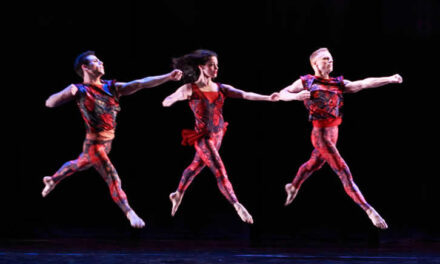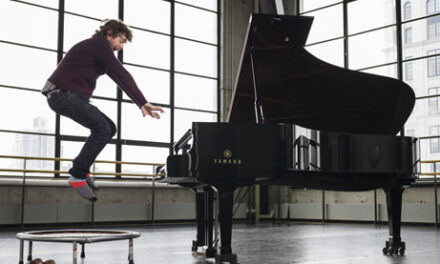The Porter Center for the Performing Arts at Brevard College, beautifully decorated for the Christmas season, was host to two Atlanta singing institutions, the Atlanta Boy Choir and Men’s Choir, recently again under the interim direction of its founder director Fletcher Wolfe. This carefully choreographed program, produced with the able assistance of Robert Henry, assistant director and accompanist, Candace Keach, flute, and Susan Brady, harp, featured music of Hanukkah and Christmas, culminating in music with the universal messages of unity and hope.
The two choirs are related institutions — the older group consists of alums of the younger group — but their looks and sounds are entirely different. The 20 boys wear scarlet choir robes and perform from memory — standing either stock still or chanting in procession — sounding like the trained choir boys of the Anglican tradition. The men sport dark blazers, sing from scores, and sound like a cross between a church choir and a men’s glee club. Judging from the age span represented in the latter group, the Atlanta Boy Choir has inspired a devoted following among its members.
The program consisted of approximately one hour of music performed without intermission and divided into themes — music of Hanukkah, that of prophesy, Jesus’s birth, the Adoration of the Christ Child, and a section entitled “We all must Come Together.” Keach and Henry played as an opening prelude the “Allegretto” from a Suite for flute and piano by Godard. Later, a movement from Persichetti’s Serenade for flute and harp provided an interlude between musical sections; more importantly, the two instruments joined the piano accompaniment in several of the boy choir’s selections, the flute often doubling vocal lines and serving as a guide to intonation. The concert was designed to flow seamlessly, with the two entrances and exits of the boys programmed with ceremonial chants, and everyone else in place on stage. And yet, it didn’t really work as such. The audience interjected applause between numbers, disrupting the flow and the mood, and the choreography of events in general needed more rehearsal. Perhaps a note in the program to withhold applause until the end of sections would have helped. Also, a few program notes with texts of the pieces in foreign languages in the absence of remarks from the stage would have been appreciated.
The boys entered chanting “Ani Ma’amin” (I believe), and followed with “S’vivon” (Dreidel, spin) and “Mi Yemalel” (Who can retell). Their sound, pure and lovely, could have been more effectively projected into the hall with the use of a choral shell. “Thanks be to Thee” from Handel’s Israel in Egypt showcased the dual timbers of combined choirs with the men singing the melody against the boys’ soaring treble descant. Richard Clement, a Grammy Award winning tenor who is Artist in Residence and Professor of Voice at Georgia State University, was the featured soloist in “Comfort Ye” and “Every Valley Shall be Exalted” from Messiah. While Clement’s singing is magnificent, unfortunately he and pianist did not agree in tempo or style on the interpretation of the piece — the piano lagged behind in a romanticized legato with splayed cadential chords, hampering the soloist’s impulse to move forward, leaving Handel somewhat in the lurch. Darrel McGhee, the other tenor soloist from the group, fared much better with a soul-filled rendition of “Sweet little Jesus Boy” with Lawrence Weaver as accompanist.
Songs of Jesus’s birth were initiated by the boys’ chanting of “Hodie Christus Natus Est” from Britten’s A Ceremony of Carols; “Balulalow,” a lullaby also from the same work, featured a clear and finely projected solo by Brandon Berry. Another lullaby, the Spanish “A la nanita nana,” two German carols (“O Tannenbaum” and “Stille Nacht”), and the Gounod arrangement of “Ave Maria” by J.S. Bach rounded out this group.
The Men’s Choir switched gears in the next set, performing a cappella Palestrina’s exquisite, low-pitched motet “Adoramus te Christe,” “My Lord, What a Mornin’” (showing the greatest dynamic range and expressivity), and a lustily shouted “Boars Head Carol.” The boys rejoined with a rather slow rendition of John Rutter’s “Tomorrow Shall Be My Dancing Day,” Ben Perri as the treble soloist. To end the evening were three crowd pleasers — “The Water is Wide,” arranged by Zaninelli; “We are the World” by Ritchie, where its pop style engendered some forced sounds and lack of blending from the boys; and an arrangement for boy choir by Mann of “The Battle Hymn of the Republic.”












